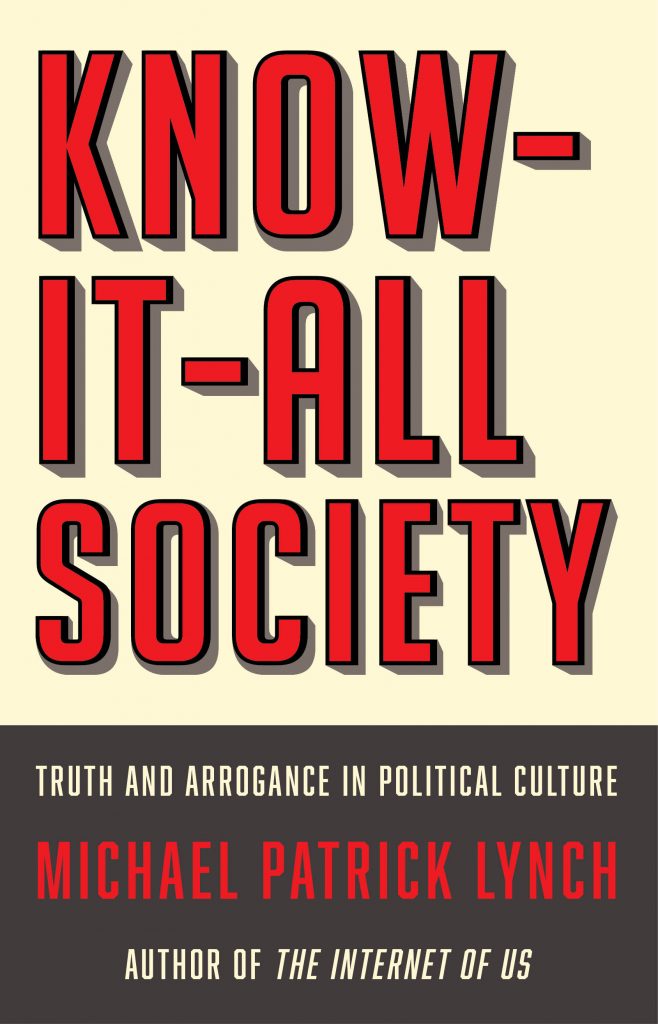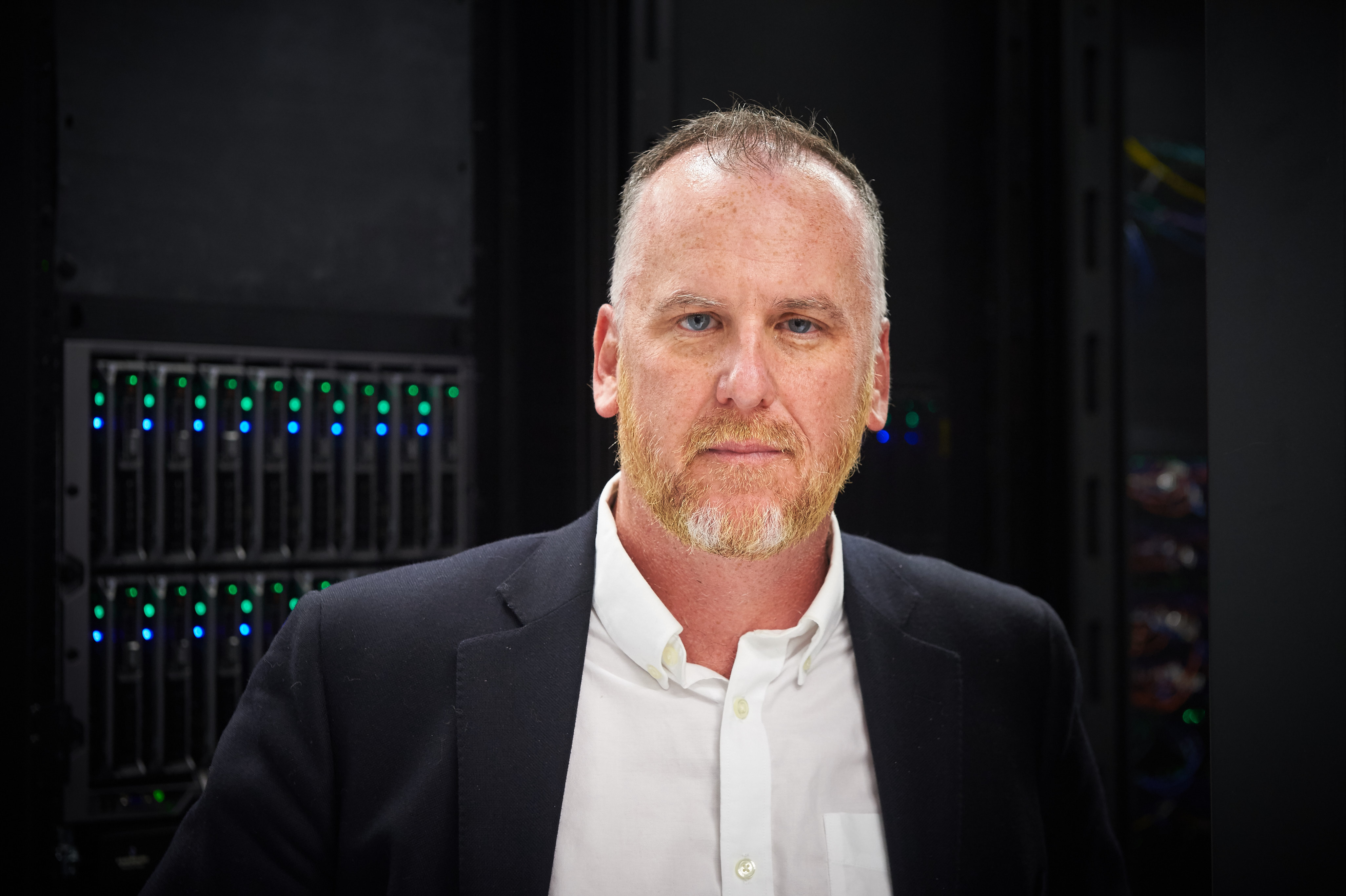The internet, particularly social media, is an outrage factory that increases political arrogance and tribalism, says Board of Trustees Distinguished Professor Michael Lynch in his new book, Know-It-All Society. Here he talks about how people become convinced about ideas, how and why they shut out other opinions, and how we can begin to remedy political egotism.

Q: In the first paragraph, you write that the book is about “how we should go about the business of acquiring and maintaining our political convictions.” What are the errors people make in this process?
A: Our convictions reflect how we see ourselves—our self-identities. Yet our identities are shaped by our relationships online as much as off. That can translate into forming convictions based on social media snowball effects—we can sometimes become invested in an issue because that’s a way to signal to our side that we are all in. And that opens us up to all sorts of bias, prejudice and just thinking with our gut. Here’s the thing: If you have to choose a body part to form your convictions, the gut is not the one to go with. What we need is a combination of brain and heart. We often ignore other people’s experiences and feelings when thinking about politics. A thought-out conviction with heart is the best sort of conviction there is.
Q: How does social media exacerbate our worst political tendencies? What are some steps that can be taken to remedy these issues?
A: By design, social media connects us emotionally more than it connects us in any other way. And that can be fun (pictures of cute cats and babies!) and socially useful (go team!). But it has a dark side. Here are two chilling facts: Posts with lots of strong moral emotion (‘this is really bad!’) get the most attention, and most people don’t actually read news stories they share. What that should tell us is that social media is a breeding ground for fake news because it is a factory for moral emotions like outrage. It is what stokes us up and connects us as a tribe that matters, not facts.
At the systemic level, more attention needs to be paid to how our digital platforms are designed. Do we really need platforms to encourage us to only react to posts with emojis? Perhaps the single most useful thing government could do is an information campaign to teach people how the economy of the internet actually works—to understand why and how the internet is so personalized.
Finally, one thing we can all do online is to read what we share. Ask yourself: is there evidence for this? Is this something I truly can get behind? Or am I just doing it to signal how much I’m committed to the tribe?
Q: You cite Socrates’s exhortation to always question your own intellectual arrogance and to have humility in your beliefs. Can you say more about that?
A: It is easy to fall into thinking that the only way to beat arrogance is with arrogance. But that’s a mistake, and bad for democracy. Leaders can be decisive but still listen to advice from those from the other side. Lincoln, for example, even went so far as to appoint political rivals to his cabinet. Real confidence comes from knowing your limits.
Arrogance is an affliction of the powerful—or those that want to be. Donald Trump is ‘exhibit number 1’ for why arrogance is so toxic—and how it appeals to those feeling insecure and under threat themselves. This is the man, after all, who declared, ‘I alone can fix it.’
Q: Where is the line between having conviction in your beliefs and being too rigid to change your mind?
A: Convictions are beliefs that reflect our identity. So, we have a tendency to protect our convictions from outside threats—like evidence that doesn’t point in their direction. That is easy to do when we are dealing with straightforward moral or religious matters—for which hard evidence is hard to come by.
A real sign that something has gone wrong, though, is when we start taking simple matters of fact and making them into convictions. That is what happens when we turn our beliefs on complicated issues like immigration, vaccines, impeachment, or climate change into convictions. These are issues where evidence matters—and where it actually exists. But once you start taking, for example, the denial of climate change as a conviction, then the evidence, pro or con, becomes irrelevant, even if you protest otherwise. It becomes a matter of identity, and reason has gone out the window.
Q: What gives you hope that political tribalism can be bridged?
A: Human curiosity. Curiosity is what gives us creativity and that which makes us want to learn and solve problems. That is why, as [American philosopher John] Dewey thought, cultivating curiosity is vital to democracy, and why the institutions of the press and education need protection and investment more than ever.
Q: What role have the various civil-rights movements in America since the 1960s played in widening and hardening our political differences?
A: Civil rights movements have actually done a tremendous amount to combat arrogance and make people aware that what they thought they ‘knew’ they didn’t know at all. Think of the gay rights movement. Not all that long ago, many people thought they ‘knew’ that being gay was a moral failing. But today many of those same people look back on that attitude as a mistake. That’s moral growth, and growth of knowledge.
That said, I make a big deal in the book of the fact that social and demographic changes are causing many white people to feel ‘status threat.’ They perceive themselves as losing power, that the country is changing, and that causes them to strike out literally and politically. This sort of defensive fear of a loss of status is a key driver of tribal arrogance. Because tribal arrogance—the idea that we know and ‘they’ don’t—is reassuring. It makes you feel powerful again. But it can also be exploited by authoritarian despots, as we are seeing today, who feed people’s insecurity and make them see threats that don’t really exist. That is super dangerous and it is a threat to the republic.
“My wife changes my mind all the time. That’s … a testimony to the fact that trust and respect really matter when it comes to learning how to listen.” — Michael Lynch
Q: When is the last time you had your mind changed in an argument?
A: The last time I argued with my wife. She changes my mind all the time. That’s not just a joke, but a testimony to the fact that trust and respect really matter when it comes to learning how to listen.
Politically speaking, the thing that I changed my mind about most recently was the very topic of this book. I was convinced for a long time that polarization had to do with people just being bad reasoners or not valuing science. But once I started to pay attention to how people actually form their convictions, I realized that what was more important—both toward evidence but also toward themselves and each other—was people’s attitudes. This book itself is a reflection of my change of mind.



